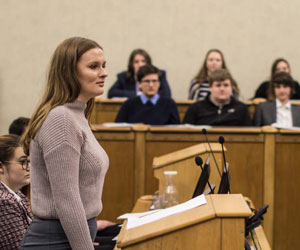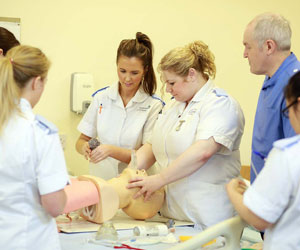If you work in the media sector, then make sure you can progress to the highest level as a manager.
The MBA Media Leadership equips you with the knowledge and understanding required to analyse, direct and develop business operations in the modern media environment involving journalism, marketing and public relations. It critically explores key issues and forces shaping the development of media in a global context, particularly convergence of activities, interactivity with audiences and entrepreneurship.
You can complete the online MBA in Media Leadership offered in exclusive partnership with the Robert Kennedy College at a pace, place and location which suits you, while continuing to work.
Our dedicated and experienced teaching team are here to support you throughout the course, which is completed through online learning thanks to our exclusive partnership with the Robert Kennedy College. Take advantage of our online resources to study at a place and pace that best fits your life, with the possibility to complete the programme in just 12 months to get you started on your future faster. Prove your skills by gaining a qualification that will show the world your skills as a top class manager.
This course is run in exclusive partnership with the Robert Kennedy College in Zurich, Switzerland and applications should be made directly at their website.
Graduate destinations
The MBA is the prime management qualification for managers, and a catalyst for those with strong career aspirations.
Course outline
Course summary
The overall aim of the MBA Media Leadership programme is to provide you with the opportunity to engage in a Higher Education experience using a flexible and distributed learning approach that will enhance your ability to develop and lead a sustainability agenda that focuses on change in the media sector. In particular this award will:
- Equip you with the knowledge and understanding required to analyse, direct and develop business operations in the modern environment of information-based media involving journalism, marketing and public relations. It critically explores key issues and forces shaping the development of digital media in a global context, particularly convergence of activities, interactivity with audiences and entrepreneurship.
- Enable you to develop your leadership practice, through critical engagement with contemporary discourses in leadership, sustainability and the social responsibility of organisations in the media sectorDevelop relevant management and organisation knowledge, both academic and professional, in line with postgraduate standards/benchmarks.
- Develop critical reflection skills and engagement with organisation and professional theory to understand, and where appropriate, challenge existing individual and organisational perspectives and practices.
- Develop, and where appropriate, apply new knowledge to add value by enhancing organisational capability.
- Develop understanding of the organisation’s strategic focus and environment and the impact of the inter-relationship between resources, customers, clients in a changing context.
- Develop further commitment to continuous personal and professional development, independence and reflective learning.
Modules
Year one
Compulsory modules
- Organisational Behaviour
- Media, Business and Society
- Marketing Management
- Strategic Management
- Dissertation
- Tackling Global-Local Challenges in Ethics, Responsibility and Sustainability
Optional modules (subject to availability and demand)
- Financial Management
- Information Management
- Corporate Strategy and Competitiveness
Programme Specification
Programme Specification
For a detailed summary of all course content please read our programme specification for this course.
Assessment, Feedback, and Teaching and Learning methods
Full details are available in the programme specification.
Timetables
The teaching timetable should be available from the end of August. Access to the timetable is through the Student Hub – you will be able to access the Student Hub after you have completed online registration. The teaching day is 9am to 6pm, Monday to Friday; please keep your other commitments open until confirmation of your teaching timetable, and bear in mind that many courses will offer placements or fieldwork which sometimes extends into the evenings and weekends.
Entry requirements
Have a question about our entry requirements?
Entry Requirements
1st or 2nd class honours degree.
Students with other qualifications may be admitted to the course. Please contact the Enquiry Centre for further details.
More information about levels and credits.
Selection criteria
A) Candidates must satisfy one, or combination, of the following conditions;
i) A UK first degree with honours at a minimum of 2:2 or above.
ii) A non-graduate qualification which the University deems to be of satisfactory standard for the purpose of post-graduate admission.
iii) In the absence of a UK first degree with honours (or equivalent), the candidate should have relevant work experience and have held a position of team leader responsibility for a minimum of three years within the previous five years.
B) For non UK degree programmes, the University will utilise the NARIC database to determine its equivalence to a UK honours degree.
C) Applicants presenting non-standard qualifications with substantial business and management experience may be invited for an interview to present their experiential learning.
D) If an applicant's first language is not English, he or she must be able to demonstrate oral and written fluency in English. Working or studying in an English-speaking environment will usually be sufficient to demonstrate an acceptable competence. Otherwise applications for admission must be accompanied by a certificate of competency in the English language from a recognised institution or programme. English language requirements for non-English-speaking students are a minimum IELTS score of 6.5 or minimum TOEFL score of 600, or equivalent.
Application information
Making your application
Applications should be made online directly to Robert Kennedy College.
What makes a good application?
We consider all aspects of your application, not simply your qualifications and grades. We look at your academic background and performance, relevant experience (particularly for professional courses where some voluntary or paid experience is required) and your reference. Above all, we look for motivation, commitment and potential - evidence that you can benefit from study at higher education level.
Make sure you include:
- Relevant qualifications/evidence of ability: check our website for the specific entry requirements required for each course. Tell us your previous academic results and your projected grades.
- A supportive reference, from an employer or your school or college.
- A good personal statement.
Explain clearly what attracts you to the course and tell us about your wider interests and experience. If you are applying for a course that incorporates professional training and placements, you should include any relevant experience or visits you have made in the workplace. Highlight your individual strengths and qualities, personal skills, capacity for teamwork, contribution to the community and your enterprise, originality and determination. Select some activities which bring out these qualities.
What next?
When we receive your application, we will send you an acknowledgement and if you are successful at this stage you will get either an offer (with an invitation to visit the campus to which you have applied), or an invitation to interview on a particular date. If we are not able to offer you a place on your chosen course we will usually try to offer you a place on a similar course and will contact you to discuss this. Alternatively, if we think you are suitable, but cannot offer you a place on your preferred campus because of the level of competition, we will offer you a place at another campus if one is available.
And if I accept?
The admissions team will contact you and send further information from February onwards about accommodation, and from May/June onwards about preparing to join the university. If you have any other queries, please telephone the admissions offices for information and advice on 0845 6061144.
Deferred entry
We welcome applications for deferred entry on some courses. If you have specific plans during your year out, indicate these on your personal statement as they may be relevant to your course and could enhance your application.
International students
Please see the international pages of our website for full details of our entry requirements (including English-language skills) as well as contacts for advice and support.
From 2009 the UK Border Agency introduced a Points-Based Immigration System (PBS) for students coming to the UK from outside the European Economic Area (EEA).
Students entering higher education will need to obtain a Confirmation of Acceptance (CAS) plus finance confirmation to obtain a Tier 4 student visa.
UK education providers are licensed by the UK Border Agency. When students apply for their visa (or entry clearance) they will need a valid Certificate of Acceptance of Studies from the university. Please note that a CAS is not a guarantee that a visa will be issued.
See the following websites for further details:
Student finance
We have a wide range of scholarships, bursaries, grants and funds available to support you throughout your studies with us. This includes the Cumbria Bursary - a non-repayable bursary designed to support first year students with a household income of less than £25,000..
Student Finance Tuition Fee PolicyResources and facilities
Our expert tutor team consists of professors and managers with considerable experience of CEL programmes and the FE sector, including members such as Oxford and Harvard graduate Professor David Duffill. We draw on the expertise of Tony Randall, our senior lecturer in Journalism, who has led in the development of digital journalism practice and has international executive level experience in major media institutions.














